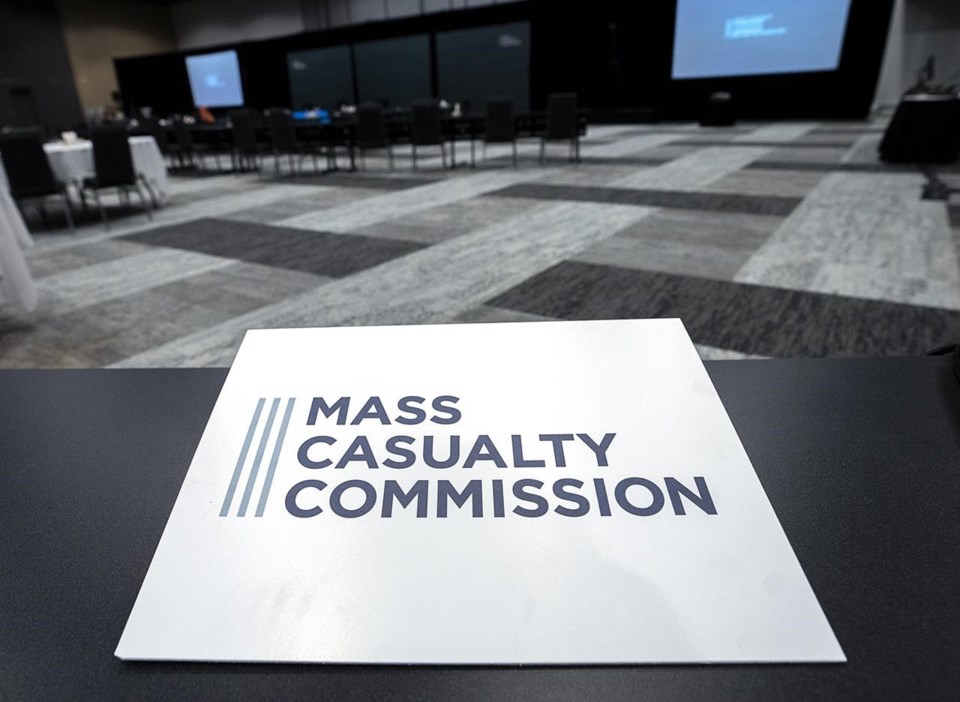HALIFAX — The organization that represents almost 20,000 RCMP members submitted Wednesday a long list of recommendations to the inquiry investigating the April 2020 mass shooting in Nova Scotia, saying the province must do something about chronic understaffing.
Among other things, the National Police Federation is calling on the province to change the way it pays for policing services. It says the current "per officer" formula encourages municipalities to reduce staffing levels to the bare minimum.
When a gunman disguised as a Mountie starting killing people in Portapique, N.S., on the night of April 18, 2020, the nearby RCMP detachment in Bible Hill, N.S., had four general duty members scheduled to work — two short of a full complement. And the emergency response team pulled together 12 members when 18 were required. Some members had to work triple shifts to compensate for the lack of officers.
"Detachments regularly operate at the minimum complement, with none of the detachment or district supervision roles staffed on the weekend or after hours," the federation says in its 21-page brief. "This is largely reflective of the lack of adequate resourcing for rural and remote policing across Nova Scotia."
The federation wants the Nova Scotia RCMP to receive stable funding through a new formula that should be tied to providing 24-hour "minimum police strength," and factors in worst-case-scenario planning. The union also wants 24 full-time emergency response team members and four full-time police dog service positions.
Aside from additional resources, the federation wants a new set of policing standards for training, equipment, technology and specialized services, which would also apply to municipal police forces. Nova Scotia's Justice Department is working on a set of standards.
The inquiry heard how there was tension between the RCMP and the municipal police forces it is supposed to work with, including those in Truro, N.S., and Halifax.
In September 2021, a “wellness report” commissioned by the RCMP highlighted an ongoing "turf battle" over operational control and funding between the Halifax Regional Police and the Nova Scotia RCMP. And in June 2022, Truro police Chief David MacNeil told the inquiry that the RCMP didn’t ask him to send help during the mass shooting, though his officers were trained in responding to active shooters.
On another front, the federation asked for improved mental health supports for members exposed to traumatic events.
"Unfortunately, following the mass casualty, many members of the RCMP reported that they did not feel they received the care that they needed," the report says. According to a survey of RCMP members conducted earlier this year in Nova Scotia, 72 per cent of respondents said the mass shooting had a "notable impact" on their mental health.¬Ý
The federation went on to suggest the province and the RCMP must do a better job of dealing with the victims of crime, particularly those who have lost loved ones to a mass shooting. Recommendations include providing better training and protocols for family liaison officers.¬Ý
In the weeks after the killings, relatives of victims said it was wrong for the RCMP to assign only one officer to assist 21 of the victims' families. They said it was clear the officer was overwhelmed by the amount of work he had to do.
Meanwhile, recommendations aimed at improving the RCMP's command structure call for more officers and staff to be called to the command post when there is a critical incident.
The RCMP command post that was set up in Great Village, N.S., on the night of April 18, 2020, had a critical incident commander and several other senior officers. But the inquiry was told the chain of command was unclear because decisions required multiple layers of bureaucracy, and the roles of those involved were not well defined.
As well, the inquiry learned that the Nova Scotia RCMP's strategic communication director, Lia Scanlan, was not at the command post when decisions were being made about alerting the public about the killer's identity and his evasion of police while driving a car that looked exactly like a marked RCMP cruiser.
On June 8, Scanlan told the inquiry that critical delays in relaying key information to the public could have been avoided had she been dispatched to the command post.
Other recommendations from the federation include calls for easier access to helicopters and airplanes, as none were available to RCMP on the first night of the killer's rampage, and improved satellite mapping and tracking technology.
The inquiry, which wrapped up public hearings in September, is investigating why it took the RCMP 13 hours to stop the gunman from killing people in northern and central Nova Scotia.
The inquiry has heard that Gabriel Wortman, a denture-maker based in Dartmouth, N.S., assaulted his common-law wife on the night of April 18, 2020, and then fatally shot 13 people in Portapique, N.S., while disguised as a Mountie. The next day, he killed another nine people ‚Äî including a Mountie and a pregnant woman ‚Äî before two RCMP officers shot him to death at a gas station in Enfield, N.S.¬Ý
The three-member commission of inquiry is expected to submit its final report by March 31, 2023.¬Ý
This report by The Canadian Press was first published Nov. 23, 2022.
Michael MacDonald, The Canadian Press



